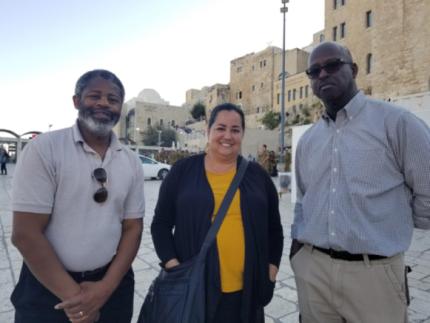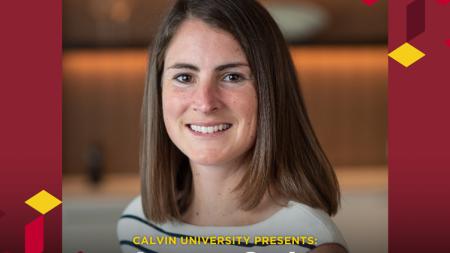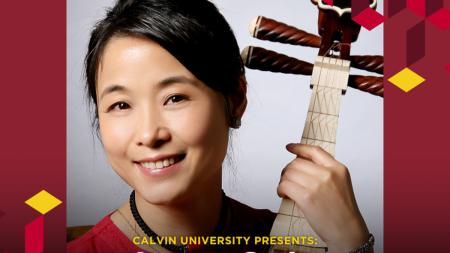CRCNA Delegation Meets Palestinian President Mahmoud Abbas

Rev. Reggie Smith, Rev. Shannon Jammal-Hollemans, and Colin Watson are in Palestine this week as part of a delegation of Christians working for Middle East peace.
A group of Christian Reformed Church in North America (CRCNA) leaders attended a luncheon in Ramallah on the West Bank in Palestine Nov. 2 marking the 100th anniversary of the Balfour Declaration.
Stemming from a letter written on Nov. 2, 1917, by then British foreign secretary Arthur Balfour, the declaration stated that the British government favorably viewed the formation of a Jewish homeland in Palestine.
Even though the Balfour Declaration didn’t categorically call for the denial of the rights of non-Jewish people in Palestine, the letter has largely been credited with creation of the state of Israel.
As such, protests have occurred in many places during this week’s centennial observance, criticizing the letter and the consequences it has led to in the ongoing tensions between Israel and the Palestinians.
The lunch in Ramallah took place at the headquarters of the Palestinian Authority to honor the British citizens who walked from Great Britain across Europe over the past four months to stand in solidarity with the Palestinian people on the anniversary of the Balfour Declaration.
“The delegation of people walked from the United Kingdom to Palestine to apologize for the tragic consequences of the Balfour Declaration on the Palestinian people,” said Shannon Jammal-Hollemans, racial justice team leader for the CRCNA. More than 60 people took part in the walk.
During the lunch, CRCNA representatives also had a chance to meet with Palestinian President Mahmoud Abbas, whose organization coordinated the lunch.
In an op-ed published by the Guardian earlier this week,Abbas wrote that, “Balfour promised a land that was not his to promise, disregarding the political rights of those who already lived there.”
The CRCNA group consists of Jammal-Hollemans, Reggie Smith (director of the CRC offices of Social Justice and Race Relations), Colin Watson (CRCNA director of ministries and administration), and Watson’s wife, Freida. They are in the Palestinian Territories as part of a delegation led by the Churches for Middle East Peace (CMEP) executive director, Mae Cannon. This trip was funded by a grant that made it possible for CRCNA leaders to attend.
“We traveled to Egypt beforehand to meet with Resonate Global mission partners there, and Reggie Smith and I are heading to Lebanon from here with CMEP to meet with Lebanese Christians,” said Jammal-Hollemans.
During the lunch, said Jammal-Hollemans, the group was able to meet Palestinian President Mahmoud Abbas and have their photo taken with him. During that meeting, Abbas expressed appreciation for CMEP’s work.
Formed in 1984, Churches for Middle East Peace is a coalition of 27 national church denominations and organizations, including Roman Catholic, Orthodox, Protestant, and Evangelical traditions, that works to encourage U.S. policies that actively promote a comprehensive resolution to conflicts in the Middle East, with a focus on the Israeli-Palestinian conflict.
Representatives of the Church of Brethren joined the CRCNA and CMEP delegation in the meeting with Abbas. Both the Brethren and the CRCNA are members of CMEP.
Smith noted that being in the Middle East, and especially in the Palestinian Territories, the scene of much violence over the years, is a response to Synod 2017’s recognition of the CRCNA’s efforts “toward peacemaking in the Middle East” (Acts of Synod 2017, p. 635). Synod “recognized that the world is hurting and violence appears to be the ubiquitous choice in most of these conflicts,” said Smith. It also called on the church to be involved and present in those difficult places.
In the midst of these conflicts, Smith added, “marginalized people are caught in the crossfire. Some countries overcorrect the need for security with a heavy hand of coercive power. Government officials ignore the needs of religious minorities to practice their faith.
“I'm thankful synod rightly reclaimed its commitment to justice, peacemaking, and advocacy. Synod asked us, as the Office of Social Justice, to find ways to help the CRC find partners and allies to link our arms to choose a better way than violence” (see Acts of Synod 2017, pp. 696-98).
CMEP is one of those partners. It advocates in congressional halls and Israeli courtrooms on behalf of, among other things, children detained without due process.
“I am thankful that synod didn't diminish the church’s efforts to fight for justice and righteousness at home and abroad. Why? As one famous preacher said, ‘When you see a good fight, get in it,’” said Smith.
During this trip, Smith said, he has met “courageous Palestinians and Israelis who have taken the teaching of nonviolent practices of resistance to the West Bank. And there are Christians in Egypt practicing their faith under unbearable conditions within Muslim majorities.”
Watson also commented on how Synod 2017 “recommitted the CRCNA to ‘endorse and support a renewed and revised multiple agency, collaborative program that would build on our existing ministry capacities’ and to ‘increase our understanding of the root and systemic causes of hunger, poverty, oppression, and injustice’” (see Acts of Synod 2017, p. 633).
He said the visit has “heightened our understanding of the Israel - Palestine conflict and the sources of suffering of the people . . . especially the displaced Palestinian people.
“We met with key leaders with a variety of perspectives from different constituencies and expressed our hope that God’s command to love our neighbor will become the reality of our world. We intend to continue to work with CMEP and others as we advocate and pray for those in need.”
Nov. 2 is a day in which many Israelis celebrate the creation of the Jewish state, but it is also “a day of devastating loss for Palestinians,” said CMEP’s executive director Cannon in a press release.
“In the midst of these contradictory realities, may church leaders be committed to justice and equal rights, security, and opportunities for a prosperous future, for all people living in Israel and the occupied Palestinian Territories,” said Cannon.


